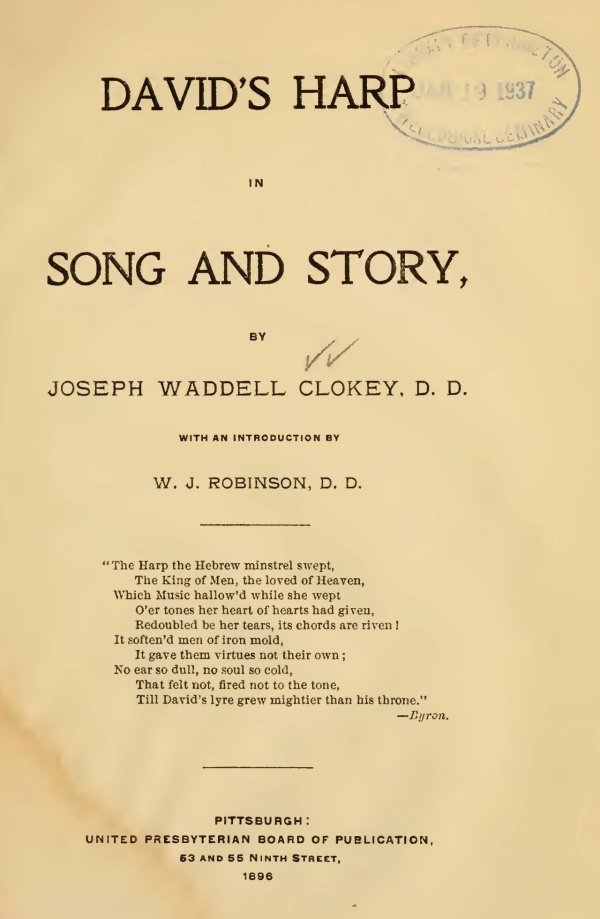The Joseph Clokey family associated with the United Presbyterian Church of North America has a long pedigree that is interwoven to various degrees with the Psalms of David. According to the Rev. Joseph Waddell Clokey, Sr. (1839-1919), his parents, the Rev. Joseph D. Clokey (1801-1884) (who served as moderator of the 1860 General Assembly of the UPCNA and was himself the son of another Joseph Clokey) and his wife Eliza (1808-1889), sang only the Psalms in public, family and private worship. Joseph Waddell Clokey, Jr. (1890-1960) would go on to become a noted composer of both sacred and secular music, as well as a professor of music. His [Jr.'s] adopted son, Art Clokey (1921-2010), was a pioneer in the field of claymation, whose characters include Gumby, and Davey and Goliath (Google honored him with a logo doodle on Oct. 12, 2011). (Art's son, Joseph Clokey, who also very involved in his father's work on Gumby, and Davey and Goliath, himself passed away on March 2, 2018.)
Joseph Waddell Clokey, Sr., meanwhile, authored a fascinating little book called David's Harp in Song and Story, which relates the value and history of the Psalms. Beginning with a series of encomiums on the Book of Psalms, Clokey goes on to trace their usage and appreciation through the centuries - among the Hebrews; within the early Christian Church; during the Dark Ages; within the Reformations of Germany, Switzerland, France, England, Scotland and the Netherlands; and among the American colonies, the New England Puritans, and the American Presbyterians.
Clokey, a UPCNA minister writing in 1896, after describing in fascinating detail the introduction and rise of Watts' hymnody within the American Presbyterian churches (he notes the first official recognition of this took place in a report by William Tennent and Aaron Burr, Sr. in 1753 and, although the Directory of Public Worship was amended in 1788 to allow for hymns, Clokey asserts that it was in 1802 that the PCUSA officially embraced Watts' hymns, and offers a heart-felt appeal to return to Biblical Psalmody in Presbyterian churches, albeit, in his preference, revised in more modern language than the 1650 Scottish Psalter:
"The author of this work—a pastor of more than twenty years in the Presbyterian Church, has witnessed with pain the 'Passing' of the Bible Psalms. Since the beginning of her 'Hymnal' era our Church has been at sea in the matter of her Psalmody. Her authorization of Hymn-Books means nothing to her congregations. For the first time in her history her authority over her Book of Praise is gone, and the people buy their hymn-books where they please.
The Hymnal of 1874 is already worn out, and the Assembly has sent forth a new one, doubtless to meet the fate of the former one.
The people of the Presbyterian Church, who love what is solid and majestic in their sacred songs, miss something in their modern Hymnals. As an old Psalm-singer, the writer would suggest it is the Bible Psalter we miss. Give us back the old Psalms, dressed in the attractive forms of these modern days, as they can be dressed; and winnow away several hundred of the hymns of our present collection, and the Presbyterian Church will do more to settle her churches in the matter of their Psalmody than will all the decrees of her courts.
It may not be out of place here for the author to suggest to the ministry of his own Church that, whilst they are endeavoring so zealously to maintain that form of doctrine which is given in the Old Confession of Faith, their efforts will prove worthless unless they see that the Psalmody of the Church breathes the same evangelical principles.
Few people read the Confession of Faith, but every week the thoughts and doctrines of our Hymns are sung into our ears and hearts; and the faith which will be held in the future will not be that of your Confession and Creed, but of your Hymnology.
At present, when the hymn-writers and hymn-collectors are so thoroughly imbued with the true doctrines of the Bible, nothing but good can result to the members of the Church. But a wave of decadence may sweep over the future Church, as it has often done in the past, when we may bitterly regret that we have lost control over the material of our Psalmody."


